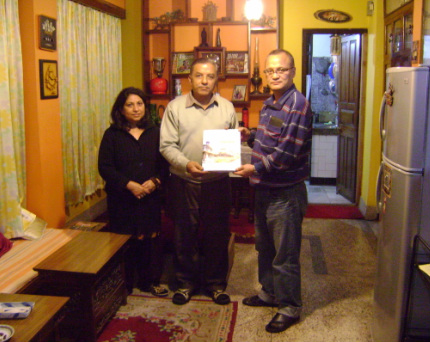
Dr. Keshav Lall Maharjan in support of our 'Sikkim : Three Decades towards Democracy'
Professor Keshav Lall Maharjan, Doctor of Agricultural Economics and Chief, Division of Educational Dev. & Cultural and Regional Studies, Graduate School for International Development and Cooperation (IDEC) from the Hiroshima University, Japan was with us last week when in Sikkim to attend the 9th International Conference on Climate Change and Sustainability in the Mountain Areas: Scope and Challenges for Regional Cooperation and Integrationheld on 8 - 9 November 2011 under aegis of the Sikkim University in the Chintan Bhavan in the capital.
He presented a paper on the Climate Variables and their Effects in Farming and Vulnerabilities and Adaptive Capacities in Nepal and also chaired on the concluding day a session on the Opportunities and Potentials of Regional Cooperation (Abstract -Read More)
Dr. Keshav Lall Maharjan is in Japan for last 32 years and is also an Adviser to the newly constituted World Newah Organization.
He presented a paper on the Climate Variables and their Effects in Farming and Vulnerabilities and Adaptive Capacities in Nepal and also chaired on the concluding day a session on the Opportunities and Potentials of Regional Cooperation (Abstract -Read More)
Dr. Keshav Lall Maharjan is in Japan for last 32 years and is also an Adviser to the newly constituted World Newah Organization.
Climate Variables and their Effects in Farming and Vulnerabilities and Adaptive Capacities in Nepal
Keshav Lall Maharjan
Hiroshima University
Abstract
Huge proportions of Nepali people derive their livelihoods from farm and forest, which are highly dependent on natural phenomena. It is one of the countries that face high degree of vulnerability to climate change. Such high degree of vulnerability poses threats on water resources, agriculture, forestry and biodiversity, and livelihood (Maharjan, Joshi, & Piya, 2009). Farming has been a major concern in this regard as food production is essential for sustaining and enhancing human welfare (McCarl, Adams, & Hurd, 2001; Schmidhuber & Tubiello, 2007). Climate is a primary determinant of agricultural productivity, in Nepal where farming is basically dependent on natural circumstances.
Climate change would influence crop yield thereby crop production to a greater extent in developing countries (Mendelsohn, 2009). The established fact of climate change i.e., changes in temperature, and precipitation, climate extremes like drought, flood and landslides, will directly affect crop yields (Intergovernmental Panel on Climate Change, 2007).
Adverse effect of climate change in agriculture is expected to affect food security situation of the country with differential regional impacts. Thus, in order to ensure food security in Nepal, information on the extent to which climate variability affects yield of food grains at regional level is crucial. Considering the importance of rice in Nepalese agriculture as well as food grain production (Joshi, Maharjan, & Piya, 2011), this study analyzes the effect of climate variables on yield of rice in different regions of Nepal after analyzing such impact on major food crops at the national level.
Degree of vulnerability of the people in Nepal is even higher due to its rugged, steep topography, and fragile geological condition. For this, studies on district level climate variables and assessing their impacts on yield of major food crops and vulnerability of the local residents through some case studies were conducted. Household surveys of the randomly selected samples were done with semi structured questionnaires to capture livelihood aspects, climate extremities, fatalities and assets damages. Adaptive capacities of the local people were assessed according to the livelihood assets and the vulnerability was analyzed according to exposures, sensitivity and adaptive capacities.
Keshav Lall Maharjan
Hiroshima University
Abstract
Huge proportions of Nepali people derive their livelihoods from farm and forest, which are highly dependent on natural phenomena. It is one of the countries that face high degree of vulnerability to climate change. Such high degree of vulnerability poses threats on water resources, agriculture, forestry and biodiversity, and livelihood (Maharjan, Joshi, & Piya, 2009). Farming has been a major concern in this regard as food production is essential for sustaining and enhancing human welfare (McCarl, Adams, & Hurd, 2001; Schmidhuber & Tubiello, 2007). Climate is a primary determinant of agricultural productivity, in Nepal where farming is basically dependent on natural circumstances.
Climate change would influence crop yield thereby crop production to a greater extent in developing countries (Mendelsohn, 2009). The established fact of climate change i.e., changes in temperature, and precipitation, climate extremes like drought, flood and landslides, will directly affect crop yields (Intergovernmental Panel on Climate Change, 2007).
Adverse effect of climate change in agriculture is expected to affect food security situation of the country with differential regional impacts. Thus, in order to ensure food security in Nepal, information on the extent to which climate variability affects yield of food grains at regional level is crucial. Considering the importance of rice in Nepalese agriculture as well as food grain production (Joshi, Maharjan, & Piya, 2011), this study analyzes the effect of climate variables on yield of rice in different regions of Nepal after analyzing such impact on major food crops at the national level.
Degree of vulnerability of the people in Nepal is even higher due to its rugged, steep topography, and fragile geological condition. For this, studies on district level climate variables and assessing their impacts on yield of major food crops and vulnerability of the local residents through some case studies were conducted. Household surveys of the randomly selected samples were done with semi structured questionnaires to capture livelihood aspects, climate extremities, fatalities and assets damages. Adaptive capacities of the local people were assessed according to the livelihood assets and the vulnerability was analyzed according to exposures, sensitivity and adaptive capacities.

 RSS Feed
RSS Feed